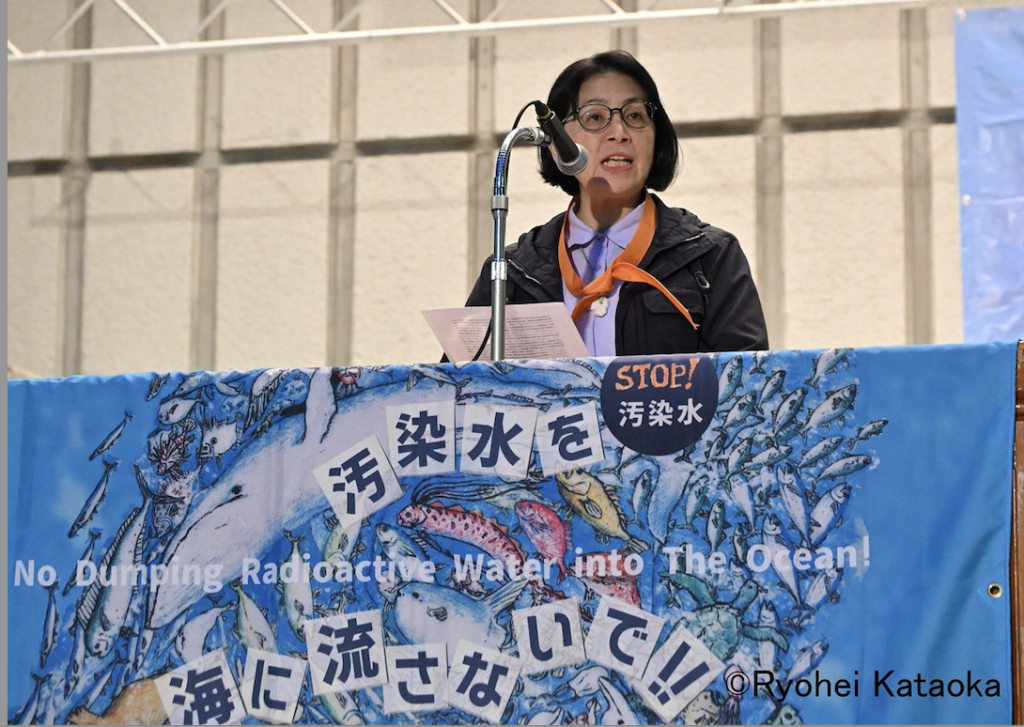Who’s Who~Kataoka Terumi: A Feminist Christian Fighting for Human Rights
By Tomoki Fukui, Adjunct Lecturer, City University of New York, John Jay College
Kataoka Terumi is a Christian feminist and a children’s rights, anti-irradiation, and antiwar activist whose antinuclear politics is rooted in her dedication to human rights. In antinuclear circles, Terumi is best known for directing the Aizu Radiation Information Center, for co-leading the Children’s Lawsuit Against Radiation Exposure, as a plaintiff in the Interfaith Trial to Abolish the Nuclear Fuel Cycle, and as a member of Citizen’s Conference to Condemn Further Pollution of the Ocean (KOREUMI), a prominent citizens’ group opposing the dumping of radioactive wastewater from Fukushima Daiichi nuclear reactor into the Pacific Ocean. She is a lifelong member of the Aizuwakamatsu Sakaemachi church, which her late father resuscitated after the Asia-Pacific War, and in which her husband now ministers.
I met Terumi while conducting ethnographic fieldwork in Fukushima prefecture for my doctoral degree. I quickly became indebted to Terumi, who accepted and encouraged me as a young wayward scholar, housed me, introduced me to other women involved in anti-irradiation efforts, and otherwise showed me a generosity that has left a lasting mark.
After the TEPCO Fukushima Daiichi nuclear disaster began in March of 2011, Terumi quickly came to organize and represent many of the antinuclear sentiments of the people of the Aizu region in western Fukushima Prefecture. Prior to the disaster, Terumi was already active in several social justice efforts: she operated her church’s daycare center, lectured on gender equality in schools, participated in local antinuclear efforts and transnational solidarity efforts with victims of the Chernobyl nuclear disaster, and established an antiwar Article 9 group, formed in 2005 in response to the neoconservative push to expand Japanese militarization. Terumi seems to personify a community of cross-movement action built first through faith, human rights, care work, and antinuclearism, and through new relationships emerging from the realities of nuclear displacement, childrearing in a radioactive environment, and witnessing the youth’s experiences of childhood in the midst of environmental catastrophe. Terumi has a selfless concern for children’s wellbeing and autonomy, and a sense of duty inspired by her experiences teaching and caring for children. This is clearly manifested in Terumi’s involvement with the Children’s Lawsuit Against Radiation Exposure, which has powerfully argued for the need to establish stringent radioprotective guidelines for educational settings, staking out ground for a society in which the health of future generations is not understood as a marginal afterthought, relegated to an unremunerated “anxiety” tasked to women, but is firmly situated front and center in national environmental policy.
A significant part of Terumi’s strength comes from her understanding of faith as the practice of living according to the principles that all life is precious; that critical thought is a necessary form of political action; and that to side with the oppressed in everyday life is a spiritual act. As she frequently says, “To think; to grapple [with a problem], is to live facing life itself.” This understanding of Christianity is shared by several generations of her family, including her four sons.
What distinguishes Terumi within politicized Christian circles, however, is her emphasis on the self. This comes from her parents’ childhood experiences as settler repatriates abandoned by the Japanese government after the Asia-Pacific War. “In an emergency, the government will not protect its citizens. You must protect yourself and your children,” they would say. She has brought these influences together to create a form of antinuclearism guided by a feminist politics of the self, where one is moved to act not as an ally who supports, but as someone who sees every issue as her own and stakes her everyday life on it.
